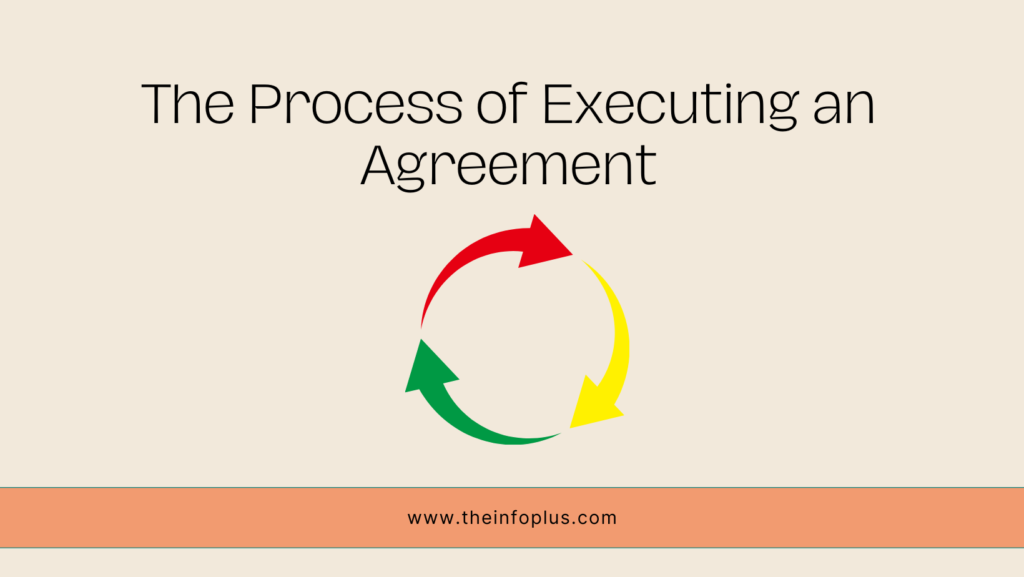- What is an Executed Agreement ?
- Key Components of an Executed Agreement
- The Process of Executed Agreement
- Types of Executed Agreement
- 1. Business Contracts:
- 2. Real Estate Agreements:
- 3. Employment Contracts:
- 4. Financial Agreements:
- 5. Intellectual Property Agreements:
- 6. Technology and Software Agreements:
- 7. Healthcare and Medical Agreements:
- 8. Government and Public Sector Agreements:
- Differences Between Executed and Executory Agreements
- Benefits and Risks Associated with Executed Agreement
- Frequently Asked Questions (FAQs)
- Conclusion
According to Info Blogger’s research, the term “executed agreement” is very important. It is critical for businesses, individuals, and legal experts to understand what is the meaning of executed agreement . Here we have explained about key components, process, types and difference between executed and executory agreements.
What is an Executed Agreement ?

An executed agreement is a legally binding contract or agreement that has been fully performed between two parties. An executed agreement, which is often synonymous with a signed contract, represents mutual acceptance and completion of the terms outlined in the document. In essence, it is a formalized commitment that holds parties accountable to their responsibilities.
Key Components of an Executed Agreement

Offer and Acceptance
An executed agreement, at its core, begins with a clear offer made by one party and accepted by another. This mutual agreement serves as the foundation for contractual obligations.
Consideration and Mutual Obligations
The value exchanged between parties is represented by consideration, which is typically monetary in nature. Mutual obligations ensure that each party keeps their end of the bargain, which fosters trust and accountability.
Legal Capacity of Parties Involved
Parties must have the legal capacity to enter into a contract for an agreement to be valid. This ensures that both parties are competent and capable of comprehending the agreement’s terms and implications.
Intention to Create Legal Relations
The intent to establish legal relations is a necessary component of a properly executed agreement. Parties must demonstrate a genuine commitment to uphold their obligations, which must be backed up by legal force.
The Process of Executed Agreement

Based on creating and reviewing terms to obtaining the signatures and ensuring regulation, executing an agreement involves a number of steps. To avoid potential disputes or incidents, proper documentation, adherence to legal standards, and attention to detail are essential.
- Drafting the Agreement : The first step is to formalize your agreement in writing. This document outlines each party’s terms, conditions, rights, and obligations. Consider it a road map that outlines exactly what each party is expected to do.
- Reviewing the Terms : Once the agreement has been drafted, both parties must carefully review it. This is the time to make certain that all terms are stated clearly, understood, and agreed upon. It’s akin to double-checking the details to avoid future misunderstandings.
- Negotiating and Making Amendments : Parties may identify areas that need clarification or modification during the review process. Negotiating terms, making necessary amendments, and reaching an agreement on the final version of the agreement are all part of this stage.
- Signing the Agreement : After the terms are finalized, both parties sign the agreement to show their acceptance and commitment. This act represents mutual consent and binds the parties to uphold their respective obligations as stated in the agreement.
- Witnessing and Notarizing (If Required) : Parties may be required to have their signatures witnessed or notarized by a neutral third party, depending on the nature of the agreement and applicable laws. This step gives the executed agreement an extra layer of authenticity and legal validity.
- Exchange of Consideration : To be legally binding, an agreement must involve the exchange of consideration, which is typically something of value (e.g., money, services, or goods). This mutual exchange cements the contractual relationship and initiates the agreement.
- Maintaining Records and Copies : Once the agreement is signed, it is critical to keep accurate records of it, including copies for all parties involved. These records serve as a reference point and provide evidence of the agreed-upon terms in the event that any future disputes arise.
- Ensuring Compliance and Monitoring : Following the execution of the agreement, parties must adhere to the terms and diligently monitor compliance. Regular communication, updates, and periodic reviews can help both parties fulfil their obligations and address any issues as soon as possible.
Types of Executed Agreement
Contracts that have been executed cover a wide range of sectors and industries, including business contracts, real estate transactions, employment agreements, and more. Each type serves a distinct purpose that is tailored to specific needs and legal considerations.
1. Business Contracts:
- Description: Business contracts are formal agreements between parties engaged in commercial activities. They outline terms related to sales, partnerships, collaborations, services, and other business-related transactions.
- Examples: Partnership agreements, sales contracts, service agreements, franchise agreements, and non-disclosure agreements (NDAs).
2. Real Estate Agreements:
- Description: Real estate agreements govern transactions related to properties, including buying, selling, renting, leasing, and property management.
- Examples: Purchase agreements, lease agreements, rental contracts, property management agreements, and land sale contracts.
3. Employment Contracts:
- Description: Employment contracts establish terms and conditions of employment between employers and employees, including roles, responsibilities, compensation, benefits, and termination provisions.
- Examples: Employment agreements, independent contractor agreements, non-compete agreements, and severance agreements.
4. Financial Agreements:
- Description: Financial agreements pertain to transactions involving monetary assets, investments, loans, and financial services between parties.
- Examples: Loan agreements, investment contracts, financing agreements, and promissory notes.
5. Intellectual Property Agreements:
- Description: Intellectual property agreements address the rights, ownership, licensing, and protection of intellectual property assets, including patents, trademarks, copyrights, and trade secrets.
- Examples: Licensing agreements, assignment agreements, confidentiality agreements, and intellectual property (IP) transfer agreements.
6. Technology and Software Agreements:
- Description: Technology and software agreements govern the use, development, licensing, distribution, and maintenance of technology and software products and services.
- Examples: Software licensing agreements, software development agreements, technology transfer agreements, and software-as-a-service (SaaS) agreements.
7. Healthcare and Medical Agreements:
- Description: Healthcare and medical agreements relate to the provision, delivery, administration, and management of healthcare services, products, and facilities.
- Examples: Medical service agreements, healthcare provider agreements, patient consent forms, and medical equipment leasing agreements.
8. Government and Public Sector Agreements:
- Description: Government and public sector agreements involve transactions, partnerships, collaborations, and services between governmental entities, public institutions, and private sector organisations.
- Examples: Public-private partnership agreements, government contracts, grant agreements, and regulatory compliance agreements.
Differences Between Executed and Executory Agreements
An completed agreement is one that has been fully performed by both parties, which means that all duties stipulated in the agreement have been met. An executory agreement, on the other hand, is a contract in which some responsibilities remain to be performed by one or both parties.
Essentially, an executed agreement represents completed actions and obligations, but an executory agreement indicates ongoing commitments that have yet to be met, distinguishing between past performance and future obligations within the contractual relationship.
Benefits and Risks Associated with Executed Agreement
- Benefits – Executed agreements offer clarity, protection, and accountability for parties involved. They provide a framework for mutual understanding and collaboration, fostering trust and long-term relationships.
- Risks – Despite their advantages, executed agreements come with inherent risks, including potential disputes, liabilities, and unforeseen challenges. Proper due diligence, legal advice, and proactive management are essential to mitigate risks effectively.
Frequently Asked Questions (FAQs)
Conclusion
According to Info Blogger research, businesses, individuals, and legal professionals navigating contractual relationships must first understand the concept of an executed agreement. Executed agreements serve as pillars of trust, clarity, and mutual accountability, from their fundamental components such as offer and acceptance to the complexities of drafting, reviewing, and signing.
Whether it’s a business contract, a real estate transaction, or an employment agreement, each type of executed agreement has its own set of implications and considerations. While they provide numerous benefits such as clarity, protection, and collaboration, it is critical to remain vigilant of potential risks and challenges. By following best practices, seeking legal advice when necessary, and maintaining open communication, parties can confidently navigate the complexities of executed agreements, ensuring compliance, fairness, and mutual success in their endeavours.
This conclusion captures the essence of your content while emphasizing the significance, components, process, types, and considerations associated with executed agreements, giving readers a concise and informative summary of the topic.

Купить двери на заказ в Москве
Изготовление дверей на заказ по индивидуальным размерам
Советы по выбору дверей на заказ
Материалы и цвета дверей на заказ
Двери на заказ: доставка и монтаж дверей на заказ
Бюджетные варианты дверей на заказ
Ламинированные двери на заказ: преимущества и недостатки
Металлические двери на заказ: надежность и безопасность
Двери на заказ для магазина
Лучшие двери https://www.mebel-finest.ru.
generic viagra australia paypal